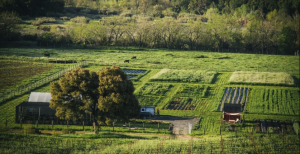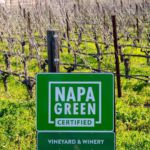
Photo by Eric Wolfinger
Healdsburg's SingleThread Farm is a culinary destination with a three-Michelin-starred restaurant and inn.

Photo by Sarah Anne Risk Photography
Diversity and sustainability are at the heart of Maryam Ahmed’s consulting company.
Creating Change in California’s Food and Wine Scene
- AFAR Advisor | By Annie Fitzsimmons |
- June 9, 2021
We talk to Maryam Ahmed about the diversity problem in the food industry and how to create sustainable change, from early education and social equity in farming to how to solve overconsumption.
Maryam Ahmed is obsessed with food and wine. Sure, many of us may say the same, but our obsession likely stops at winetastings and dinner parties, while hers has bloomed into a career: from harvest intern at a winery to a Washington wine-making degree, on to five years at the Culinary Institute of America (CIA) in Napa as director of public programs. California cooking demos? Italian food boot camps? She’s planned it all.
But the New York–born Napa resident now runs a creative consulting company that takes what she learned in the food and wine industries and tries to upend it, with diversity and sustainability at the heart of what she does.
“For the record, there is a huge diversity problem in the food industry,” she says. “A lot of people think entry is where the issue is, but we don’t have mechanisms in place to elevate people of color to leadership positions in companies, where we have the biggest impact.”
Ahmed thrives on bringing people together to talk—or more importantly, to listen, all while eating and drinking well—and creating change in the industry through her vast network. Ultimately, she says, she’s not a food or wine person, but a people person.
Her company also specializes in project management, community building, and identifying talent, where a lot of her diversity and inclusion work comes in. It’s a big part of how she decides who to work with. “We do say if you’re not committed to effectively serving marginalized communities or creating sustainability, come back to us in a year when you’ve done more of the work.”
Ahmed talks about all things California, the biggest challenges facing the food industry today, and the wineries and restaurants that deserve a bigger spotlight.
In this series, we are spotlighting a destination we love—California—through the experiences of people we admire who call it home.
How did you end up in California and working for the Culinary Institute of America?
I grew up in Binghamton, New York, went to Cornell, and didn’t want to work a corporate job, so I ended up at a winery to start. Eventually, I got my wine-making degree in Washington State and ended up taking a consumer education position at the CIA in 2015 called “food enthusiast manager.” We planned anything from one-hour cooking demos to five-day Italian cuisine boot camps. We tripled the programs, added family programs, and did so much consumer research. I worked with chef Andrew Zimmern on Conversations at Copia. We talked about issues like equity, culture, cuisine. I loved being able to share something with the consumer that’s really actionable and sticks with them, maybe challenges their perspective.
California is at the forefront of a lot of sustainability and diversity initiatives. Have you seen this part of the industry growing and actually creating change?
Yes, for sure. Starting with just the conventional farming methods—we’re seeing a lot of change. The first 100 percent electric tractor, Monarch, started here—with that, you’re hugely reducing carbon emissions. It’s lighter, so there’s less soil impact and less impact on potential erosion, health of the microbes, and all of that. And there has been a huge consumer shift to shopping more at farmers’ markets during the pandemic, which directly supports the farmers and people who work there.
Then when you go to the social equity side, yes, things are changing. We cannot function in this state without our agricultural workers, fair wages, healthcare, housing—the California housing market is insane—and just general best practices. It’s a difficult commitment for companies and contractors to make, but I was recently part of the working group for the social equity portion of the Napa Green certification that was just released. The conversation centered around how we are going to create a bigger ripple within a much larger picture.
For organic food, I suggest you look at regenerative organic farming, which focuses on the health of the soil. This doesn’t speak to the social equity element of farming, though, and there isn’t enough being done there. The person that picks strawberries also picks grapes and lettuce. How do we push on agricultural contractors and make the biggest impact for workers across the board?
What can we be doing to support restaurants beyond eating there or ordering takeout?
The best restaurants in California rely on the farms they work with. As consumers, to help keep those farms in business while the restaurants ramp up again is really important. So you’re not just getting takeout, maybe you’re also getting a CSA box that works with your favorite local restaurant. Then I’d say, share on social media what you hear from restaurants about specials, or new openings—and help contribute to that community conversation.
What is some of the talent in California right now that you think deserves the spotlight?
In the East Bay, Tanya Holland from Brown Sugar Kitchen. I freaking love her. She’s committed to a plant-forward menu. Nyum Bai in Oakland is amazing—chef Nite Yun is a community activist and just serves incredible food.
I love SingleThread in Healdsburg, with a husband-and-wife team. And La Taberna in Napa—it’s one of those places that locals love and tourists are lucky to discover. It’s just very true to Spanish cuisine and beverages.
For wineries, I love Matthiasson, McBride Sisters, Corison, Artesa Winery, and St. Clair Brown.
Do you think we can help solve the diversity problem in the food industry by focusing on primary education?
I think discovering your passion for food starts early. The question is: Are we creating access points for life-changing moments around food in early education?
There are two programs to look into that are doing amazing things for kids and students: the Edible Schoolyard Project by Alice Waters, which teaches children about where food comes from and how it’s grown, and the California Restaurant Association Foundation, which empowers young people to work in the restaurant industry. But those are not part of primary education, they’re nonprofits.
You’re passionate about solving food waste and overconsumption. Why?
Here’s why food waste is a problem: There is too much food for certain people and not enough food for certain people. We have a consumption-driven environment in the U.S., so we’re buying more than we need and we’re incentivized to buy in bulk. Food waste is a huge contributor to global warming. When we put vegetables into a plastic bag rather than compost, and seal it up—that creates an anaerobic environment that takes way longer to decompose than in open air. But it’s really hard for people, and it’s regulated county by county here.
The city of Napa has an amazing compost program—I put [my compost] out every week. But it’s not that way for everyone. There are companies like Rethink Food repurposing food excess and creating meals for people who don’t have access. Excess into access.
But here’s how you solve it: Buy and use less. It’s really important that you don’t buy more than what you need.
Making the commitment to third party certification takes time and effort, but it is worth it to demonstrate our commitment to the community and to protect our watershed, our land and the air we breathe.
- Susan Boswell, Chateau Boswell Winery


